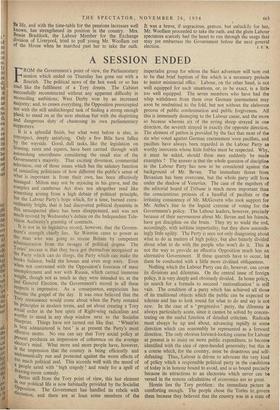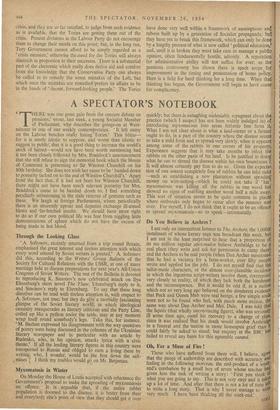A SESSION ENDED
FROM the Government's point of view, the Parliamentary session which ended on Thursday has gone out with a flourish. The political news of the last week or so has read like the fulfilment of a Tory dream. The Cabinet successfully reconstructed without any apparent difficulty in reconciling ambitions; West Derby won by an increased tnajority; and, to crown everything, the Opposition preoccupied not with the still undischarged task of finding a strong enough Plank to stand on at the next election but with the dispiriting and dangerous duty of chastening its own parliamentary supporters.
It is a splendid finish, but what went before is also, in retrospect, deeply satisfying: Only a few Bills have fallen by the wayside. Good, dull tasks, like the legislation on . housing, reins and repairs, have been carried through with astonishing smoothness considering the small size of the Government's majority. That exciting diversion, commercial television, one of those issues which has the salutary function of reminding politicians of how different the public's sense of What is important is from their own, has been effectively managed: Milton may not be rejoicing in his ,grave, and the complex and cumbrous Act does not altogether read like something arising from a high debate of political principle, but the Labour Party's hope which, for a time, burned extra- ordinarily bright, that it had discovered political dynamite in this unsuspected place has been disappointed, and was not much revived by Wednesday's debate on the Independent Tele- vision Authority's granting of contracts. It is not in its legislative record, however, that the Govern- ment's strength chiefly, lies.. Sir Winston came to power as the man who was going to rescue Britain by competent administration from the ravages of political dogma. The Tories' success is that they have got themselves recognised as the Party which can do things, the Party which can make the books balance, build the houses and even stop wars. Even When not contrasted with the Opposition's forecasts of mass unemployment and war with Russia, which carried immense ,weight. though not as much as they were intended to, at the last General Election, the Government's record in all these respects is impressive. As a consequence, empiricism has beeome the gospel of the day. It was once believed that the Tory renaissance would come about when the Party restated its principles in modern terms, and set about creating a Tory social order in the best spirit of Right-wing radicalism and Worthy to stand in any shop window next to the Socialist blueprint. Things have not turned out like that. ' Whate'er is best administered is best' is at present the Party's most effective motto. No one can say that Tory social policy at present produces an impression of coherence on the average !lector's mind. What more and more people have, however, IS the impression that the country is being efficiently and undramatically run and protected against the worst effects of too much political zeal. This accords well with the mood of a people sated with ' high tragedy' and ready for a 'spell of drawing-room comedy. Better still from the Tory point of view, this last element in our political life is now habitually provided by the Socialist YPPosition. The Government has handled its rebels with discretion, and there are at least some members of the imperialist group for whom the Suez adventure will turn out to be that brief baptism of fire which is a necessary prelude to junior ministerial office. ' Labour, on the other hand, is not well equipped for such situations, or, to be exact, is a little too well equipped. The seven members who have had the whip withdrawn from them over German kearmament may soon be readmitted to the fold, but not without the elaborate process of public condemnation and public forgiveness. All this is immensely damaging to the Labour cause, and the more' so because whereas six of the erring sheep strayed in one direction, the seventh strayed in exactly the opposite direction. The element of pathos is provided by the fact that most of the six who voted against German rearmament 'were pacifists, and pacifists have always been regarded in the Labour Party as worthy innocents whose little foibles must be respected. Why, it must be asked, should these men suddenly be made examples ? The answer is that the whole question of discipline in the Labour Party has now to be considered against the background of Mr. Bevan. The immediate threat from Bevanism has been overcome, but the whole party still lives under the shadow of Vesuvius. The case of the members of the editorial board of Tribune is much more important than the conscientious protests of a handful of pacifists or the irritating consistency of Mr. McGovern who took support for Mr. Attlee's line to the logical extreme of voting for the Government's policy. The Labour leaders, however, precisely because of their nervousness about Mr. Bevan and his friends, have got discipline on the brain. They try to wield the rod, accordingly, with sublime impartiality, but they show astonish- ingly little agility. The Party is seen not only disagreeing about what to do in matters of high policy, but also bitterly divided about what to do with the people who won't do it. This is not the way to provide an effective Opposition much less an alternative Government. If these quarrels have to occur, let them be conducted with a little more civilised obliqueness.
Nothing which the Labour Party can do, however, can cover its divisions and dilemmas. On the central issue of foreign policy, it is very deeply and obviously divided. In home policy, its search for a formula to succeed nationalisation' is still vain. The condition of a party which has achieved all those of its traditional objects which the public can be expected to tolerate and has to look round for what to do and say is not new. In the case of a ' progressive' party, the dilemma' is always particularly acute, since it cannot be solved by concen- trating on the useful function of detailed criticism. Radicals must always be up and about, advancing rapidly in some direction which can reasonably be represented as a forward direction. The only obvious forward-looking course for Labour at present is to insist on more public expenditure, to become identified with the idea of open-handed generosity; but this is a course which, for the country, must be disastrous and self- defeating. Thus,. Labour is driven to advocate the very kind of policy which a responsible political party in the conditions of today is in honour bound to avoid, and is so bound precisely because its attractions to an electorate which never can be versed in the remote calculations of economics are so great.
Herein lies the Tory problem: the immediate picture is comforting enough. The people chose the Tories to_govern them because they believed that the country was in a state of crisis, and they are so far satisfied, to judge from such evidence as is available, that the Tories are getting them out of the crisis. Present divisions in the Labour Party do not encourage them to change their minds on this point; but, in the long run, Tory Government cannot afford to be simply regarded as a ' crisis measure,' otherwise the.need for the Tories will always diminish in proportion to their successes. There is a substantial • part of the electorate which really does derive aid and comfort from the knowledge that the Conservative Party can always be called in to remedy the worst mistakes of the Left, but which once the mistakes are remedied prefers its affairs to be in the hands of decent, forward-looking people.' The Tories have done very well within a framework of assumptions and taboos built up by i generation of Socialist propaganda; but they have yet to break this framework, which can only be dong by a lengthy process of what is now called political education; and, until it is broken they must take care to manage a public opinion, often fundamentally hostile, adroitly. A reputation for administrative ability will not suffice for ever; as the pensions controversy has shown there is much scopc, for improvement in the timing and presentation of home policy. Here is a field for hard thinking for a long time. When that thinking has begun, the Government will begin to have cause for complacency.











































 Previous page
Previous page